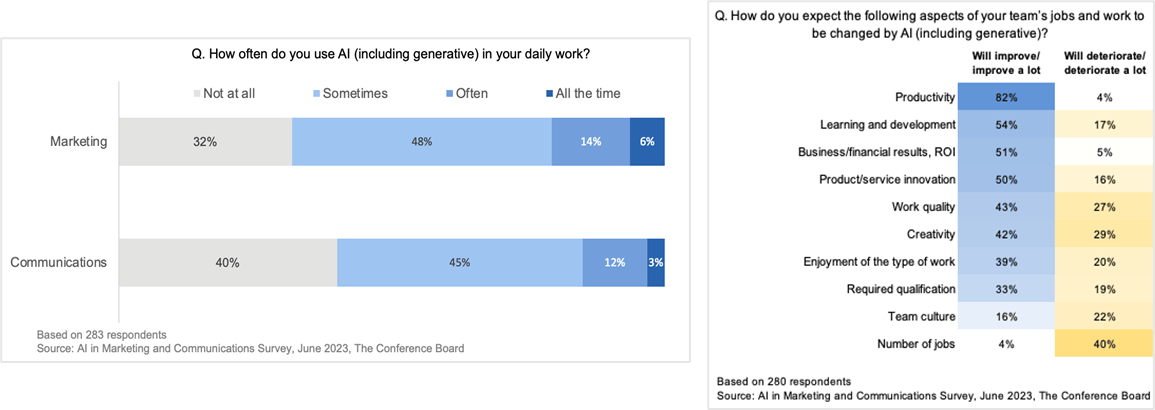The Transformative Impact of Artificial Intelligence on Marketing: Adapting for Success
Artificial intelligence (AI) use has skyrocketed in the last few years. In 2023, AI use among the public increased by nearly ten times[1]. It’s greatly impacting industries and society, reshaping traditional approaches and roles. Its impact on marketing is profound. From content marketing, marketing automation, analysis, research and many other areas, AI adoption by marketers is rapidly increasing and its uses in the marketing department are expanding.
AI Use and Investment in the Marketing Department
AI use has become common in the marketing department. A recent study by The Conference Board found that 87% of marketers have used AI or experimented with AI tools and that 68% of marketers are using AI in their daily works[2]. A Deloitte Digital study found that three of the top five AI objectives of the companies they surveyed was marketing-related s[3]. While a Gartner study found that 63 percent of marketing leaders have already invested in artificial intelligence (AI) or were planning to do so within the next twenty-four months[4]. The CMO Study — a joint study conducted biannually by Deloitte LLP, the American Marketing Association and Duke University’s Fuqua School of Business that samples 316 senior marketing leaders at for-profit companies — found in their most recent study (Sept 2023) that in the past three years, around half of marketing leaders reported using AI for content creation. More than half used AI for blogs, website content, social media and email contents[5].
82% of marketers and communicators surveyed by The Conference Board expect that further adoption of AI will lead to productivity improvements, enhance learning and development and improve financial results. Half of respondents said that AI will in future product and service innovation. The top AI applications by marketers included summarizing content (44%), doing the legwork/inspiring thinking (41%), personalizing customer/user content (33%), conducting research (30%), producing content faster (30%), and improving customer service (17%). Communicators are currently using AI for summarizing content (41%), doing the legwork/inspiring thinking (35%), producing content faster (28%), conducting research (26%), writing press releases (17%), and writing speeches (14%)[6]. 
Seven Areas Where AI is Significantly Impacting Marketing:
1. Marketing Automation: AI has revolutionized marketing by automating tasks such as data analysis, customer segmentation, personalized content creation, and social media management. This automation streamlines processes, enabling marketers to focus on strategic aspects of their campaigns.
2. Data Driven Decision–Making: Marketers now leverage AI for data-driven decision-making. Advanced analytics and machine learning algorithms analyze vast amounts of data, providing insights into consumer behavior, preferences, and trends, allowing for more impactful and targeted strategies.
3. Personalization and Customer Experience: AI-driven algorithms enhance marketing by delivering personalized experiences to prospects and customers. By analyzing user data, AI tailors content, advertisements, and recommendations, creating a more engaging and personalized customer experience.
4. Chatbots and Customer Interaction: AI-powered chatbots and virtual assistants play a crucial role in real-time customer interaction, providing personalized recommendations, addressing queries, and guiding users through the purchasing process. Striking a balance between automated personalization and a human touch remains a challenge.
5. Content Creation and Optimization:
AI tools are increasingly used for content creation and optimization, handling tasks such as generating compelling copy and optimizing website content for search engines. This allows marketers to focus on creativity and strategy.
6. Predictive Analytics:
AI-driven predictive analytics revolutionizes marketing forecasting, enabling marketers to anticipate trends, identify opportunities, and mitigate risks more effectively, enhancing the overall effectiveness of marketing campaigns.
7. Programmatic Advertising:
Programmatic advertising, powered by AI, automates the buying and placing of digital ads. AI algorithms analyze user behavior in real-time, ensuring ads are delivered to the right audience at the right time, maximizing ad spend efficiency.
Current use of artificial intelligence by marketing departments is only scratching the surface of what AI can do for marketing. There’s no question that AI’s use in marketing is going to significantly increase in the next few years. According to Fuqua marketing professor Christine Moorman, who led the study, “Marketing can increase use of AI to improve marketing ROI by optimizing the content and timing of digital marketing, for progammatic advertising and media buying, for predictive analytics for customer insights, and targeting decisions. These are all currently underutilized, with only one third of marketing organizations using AI for these purposes.”[7]
Marketers Uncertain of the Long-Term Impact of AI on Creativity, Work Quality, and Risk Management
Marketers and communicators are divided on the long-term impact of AI in their fields beyond boosting productivity and business results. Forty percent of those surveyed by the Conference Board anticipate that AI will lead to work quality and creativity improvement, while nearly thirty percent of those surveyed were pessimistic and expect that work quality and creativity will deteriorate with increased AI use. “For marketers and communicators, a critical question has been AI’s impact on creativity and quality of work,” said Denise Dahlhoff, Senior Researcher, Consumer Research at The Conference Board. “Our research suggests that there’s reason for optimism. If AI is used to inspire and augment—not replace—human ideas, the effect might well be synergistic and help elevate overall creativity.”[8]
Concerns About How AI Will Impact Marketing Job Availability and Increased Risk
Only four percent of those surveyed by The Conference Board felt that AI will lead to increased marketing and communications jobs, while 40% believe it will result in a decline of jobs. Even more, 22% of those surveyed expect negative effects on team culture, while 16% believe it will lead to improvements. There is widespread concern about the potential dangers of AI and a call for greater risk in using AI such as misinformation, legal uncertainty and data security. It is expected that AI-related regulations and best practices emerge that concerns will decrease.[9]
Junior and Mid Level Marketers are Ahead of Senior Marketers When It Comes to AI Adoption
The Conference Board study found that mid-level and junior marketers are “at the forefront of adopting AI in their work” ahead of senior marketers, putting them in an ideal position to shape the adoption and evolution of AI within their organizations. This presents a significant opportunity for these professionals and should also serve as a wake up call to senior marketers. [10]
According to a recent study by GetApp drives home the point. Their study found that 71% of marketers (from small and medium businesses) surveyed said that their companies would pay more for interns with AI experience. Further, while there are concerns that AI could result in the elimination of marketing positions, 63% of surveyed marketers expected their companies would hire a similar number of interns in 2024 as 2023, while 30% expected to hire more interns. Even more, 36% of respondents believed that AI would result in increased demand for interns in 2024, while 12% thought it would reduce the demand. 77% of respondents find that AI has fundamentally changed the skills required for marketing interns. The areas these marketing departments are most significantly leveraging intern AI skills are with data analysis (48%), mistake reduction (42%), and improving the efficiency or speed of processes and workflow (36%).[11]

CHART: Areas of AI skills and knowledge that marketing interns should possess in 2024. Credit: GetApp
Will AI Replace or Add Marketing Jobs?
While there’s no question that the use of AI has strong implications for the marketing department and is resulting in a skill shift that has significant implications for the staffing of marketing departments, and consequently, for marketing professionals, it seems very likely that increased AI use will result in the loss of some jobs, especially at lower levels, particularly jobs with responsibilities that can easily be replaced with AI tools. However, a strategic and well-implemented use of AI technology can provide the marketing department with great opportunities to show quantified value to the organization that can result in growth for the department and the profession as a whole. AI automates routine marketing and communications tasks, provides analysis and has the power to elevate and transform marketing roles. The majority of experts believe that AI is more likely to transform rather than replace marketing jobs entirely.
As AI tools are increasingly being used to handle routine marketing and communications tasks, there is a shift in the required skillsets needed in the marketing department. Creativity, strategic thinking skills and interpreting AI results and analysis are critical in the AI age. Consequently, marketing roles will likely evolve to encompass more strategic and creative responsibilities as a result of AI. The evolving landscape necessitates acquiring new skills, understanding AI algorithms, interpreting data insights, and creatively collaborating with AI tools.
AI and Your Career in Marketing
Despite AI’s capabilities, it lacks the innate understanding and emotional intelligence that humans bring. Successful marketing campaigns rely on human creativity, empathy, and the ability to connect with diverse audiences. AI enhances a marketing manager’s ability to perform and manage marketing more effectively. Gaining experience with AI tools is increasingly important for marketing professionals to stay competitive in the profession.
SOURCES:
1 Insider Intelligence.
2,6, 8, 9, 10 The Conference Board
3 Deloitte Digital
4 Gartner
5,7 CMO Study, American Marketing Association / Duke University Fuqua School of Business
11. Get App






